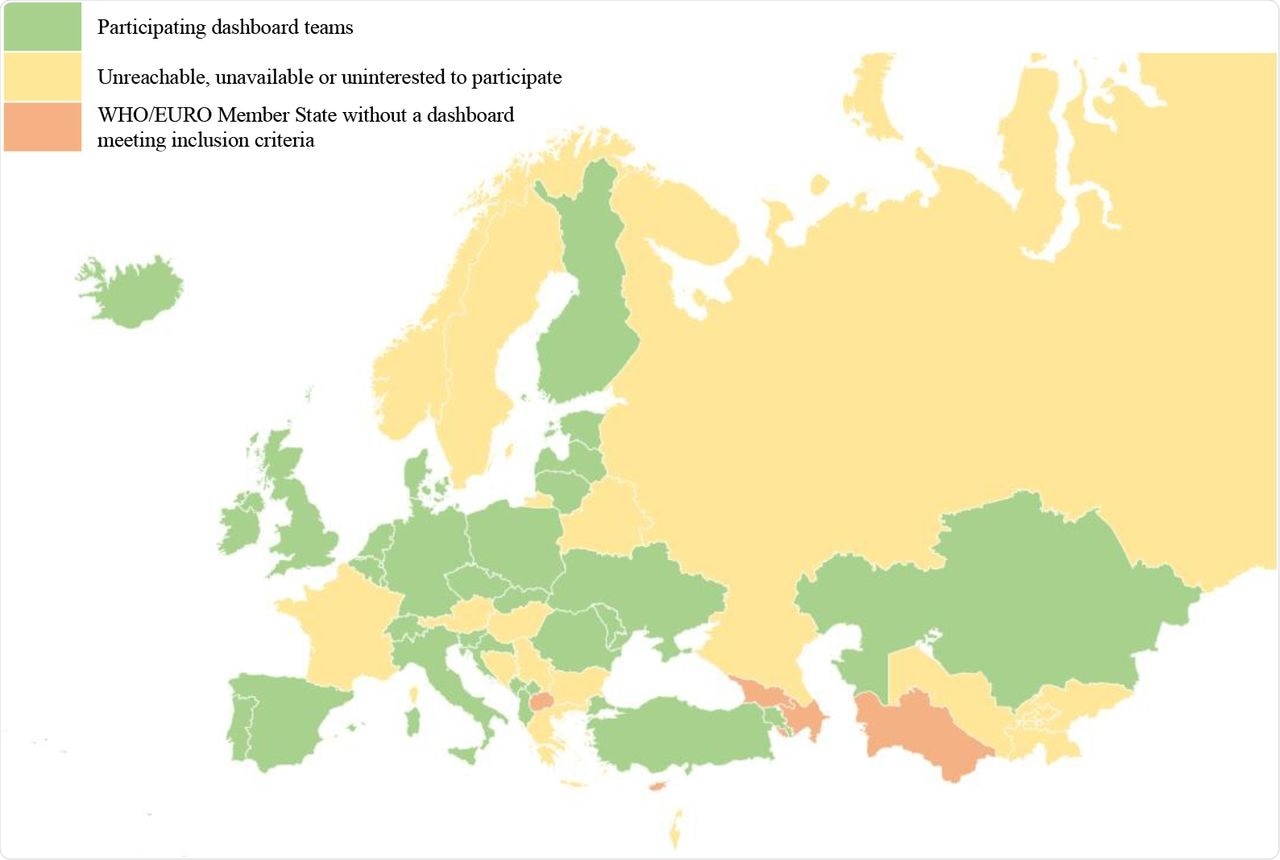During the coronavirus disease 2019 (COVID-19) pandemic, governments across the world prioritized tools for delivering COVID-19 data and other pandemic-related information through the development of public web-based dashboards. These types of dashboards are dynamic and interactive visual displays that are arranged on a single screen for viewing key performance indicators.
 Study: The experiences of 33 national COVID-19 dashboard teams during the first year of the pandemic in the WHO European Region: a qualitative study. Image Credit: Blue Planet Studio / Shutterstock.com
Study: The experiences of 33 national COVID-19 dashboard teams during the first year of the pandemic in the WHO European Region: a qualitative study. Image Credit: Blue Planet Studio / Shutterstock.com

 This news article was a review of a preliminary scientific report that had not undergone peer-review at the time of publication. Since its initial publication, the scientific report has now been peer reviewed and accepted for publication in a Scientific Journal. Links to the preliminary and peer-reviewed reports are available in the Sources section at the bottom of this article. View Sources
This news article was a review of a preliminary scientific report that had not undergone peer-review at the time of publication. Since its initial publication, the scientific report has now been peer reviewed and accepted for publication in a Scientific Journal. Links to the preliminary and peer-reviewed reports are available in the Sources section at the bottom of this article. View Sources
Although the use of dashboards for public reporting during a pandemic is new, dashboards have been successful in reporting COVID-19 data, as demonstrated in a recent review published on the medRxiv* preprint server. In this study, the researchers explored the development of COVID-19 dashboards during the first year of the pandemic. They also identified the common barriers, enablers, and lessons based on the experiences of the participating teams across themes pertaining to pre-pandemic context, people, processes, software, data, and users.
Study design
In total, 80 informants from 33 national COVID-19 dashboard teams participated in the study from across the World Health Organization (WHO) European Region. A purposive quota sampling approach was undertaken and multiple methods were used to identify and recruit the dashboard teams.
Between April and June 2021, semi-structured group interviews were conducted to help develop descriptive and explanatory themes using elaborate coding and thematic analysis. The participants also attended a validation workshop held in June 2021. A majority of the dashboards were launched between Feb and May 2020.
Key findings
The WHO European Region consists of several countries/territories of wide-ranging population sizes, which have health information systems at different development stages and distinctive administrative traditions. Upon exploring this vast region, the researchers found more similarities than differences in the development stories described by the 33 national COVID-19 dashboard teams.
Additionally, prioritizing good governance is a tradition in this region; therefore, the governments developed public-facing COVID-19 reports at an astounding speed. International factors were leveraged to stimulate pan-European collaboration and devise a common approach to public reporting and sharing of lessons across contexts.
 Geographic representation of participating COVID-19 dashboard teams.
Geographic representation of participating COVID-19 dashboard teams.
National health information (NHI) systems struggled to provide accurate and timely data for COVID-19 dashboards, which is necessary for the development and evolution of these dashboards. This emphasizes the need for ongoing investment in integrated and interoperable national-level data sources, as well as digital infrastructure across primary, secondary, and social care.
Digital technologies such as dashboards must adapt to their intended purposes. The data obtained through dashboards should not only be actionable but should also be communicated clearly to the end-users.
The team of researchers observed differences in the extent to which dashboard teams explored, discussed, and defined the dashboard’s purpose. While some preferred to present raw data for the public, others endeavored to provide interpretations in the form of visuals.
Lastly, the findings of the current study suggest that systematic approaches should be adopted to explore user needs and use patterns. This will enable dashboards to bridge the gap between the presentation and interpretation of information.
Study strengths and limitations
Since the researchers worked in partnership with the WHO, they had special access to national governmental COVID-19 dashboard teams. The research team composition enabled the use of a wide range of languages during data collection, which helped in recruitment and enhancing the quality of exchanges during interviews.
Some of the limitations associated with the current study include variabilities due to the size and composition of core dashboard teams that were not taken into consideration while deriving the study results. Furthermore, while group interviews enriched the data collection, using this approach induced group pressure resulting in socially desirable responses. A final limitation is that the findings were not aligned with the current state of implementation and gave a snapshot of only the first year of the COVID-19 pandemic.
Future directions
The current study demonstrated the benefits of dashboards and established them as the future of public reporting, especially during a pandemic. Previous studies have underscored the implementation and management costs of using dashboards.
In the context of COVID-19 reporting, the dashboards proved to be powerful tools that used little resources and gave real-time, interactive, and visual data. The researchers flagged areas for improvement and handled new challenges like damaging misinformation.
More intensive resource planning and investments are needed for the continued and more extensive use of dashboards for non-COVID monitoring in areas like resilience and recovery plans, as well as seasonal flu and patient safety monitoring.

 This news article was a review of a preliminary scientific report that had not undergone peer-review at the time of publication. Since its initial publication, the scientific report has now been peer reviewed and accepted for publication in a Scientific Journal. Links to the preliminary and peer-reviewed reports are available in the Sources section at the bottom of this article. View Sources
This news article was a review of a preliminary scientific report that had not undergone peer-review at the time of publication. Since its initial publication, the scientific report has now been peer reviewed and accepted for publication in a Scientific Journal. Links to the preliminary and peer-reviewed reports are available in the Sources section at the bottom of this article. View Sources
Journal references:
- Preliminary scientific report.
Barbazza, E., Ivankovic, D., Davtyan, K., et al. (2021). The experiences of 33 national COVID-19 dashboard teams during the first year of the pandemic in the WHO European Region: a qualitative study. medRxiv. doi:10.1101/2021.11.23.21266747. https://www.medrxiv.org/content/10.1101/2021.11.23.21266747v1
- Peer reviewed and published scientific report.
Barbazza, Erica, Damir Ivanković, Karapet Davtyan, Mircha Poldrugovac, Zhamin Yelgezekova, Claire Willmington, Bernardo Meza-Torres, et al. 2022. “The Experiences of 33 National COVID-19 Dashboard Teams during the First Year of the Pandemic in the World Health Organization European Region: A Qualitative Study.” DIGITAL HEALTH 8 (January): 205520762211211. https://doi.org/10.1177/20552076221121154.